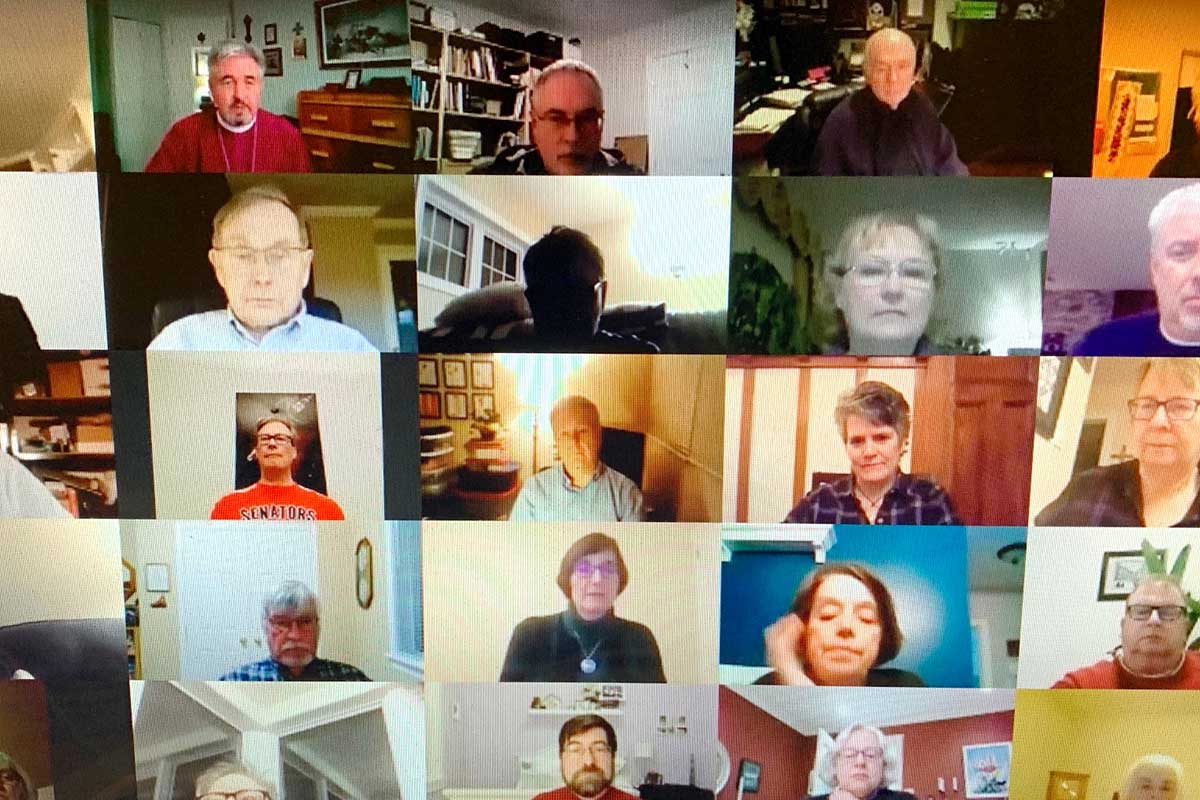Bishop Shane Parker offered some encouragement to more than 240 wardens and treasurers from across the diocese who gathered online on Jan. 25 to hear an update on how the Diocese had weathered the economic turbulence of 2020.
Bishop Parker began by reminding his listeners to take comfort in knowing that “even in the darkest moments of winter, the difficult things we face in any season of our lives, … God in Christ walks with us, journeys with us.”
Then turning to the specific financial challenges facing Anglican churches, he said, “I know from talking to my colleagues in the Ontario House of Bishops that virtually every diocese has experienced about a 20 percent loss in revenue throughout the last year…. So if you found that your [parish] givings have gone down, you are in very good company.”
He went on to acknowledge the strain many are feeling. “While that can be distressing at the best of times, it is even more distressing to sense that somehow we are not going to be able to keep up in our individual parishes.”
But parishes need not feel that they are struggling alone, he said. “While the parts of our parish ministry may in some cases be experiencing a lot of stress and difficulty, we as a diocesan church are very strong.” He compared the diocesan church to a strong body with two arms; one being parish ministries and the other community ministries. “Our body is strong and it can support and uphold the two arms,” he said. “As a diocesan church we have tremendous resources and tremendous strength. We will carry one another through this, and we will forge a new future for ourselves as a diocesan church having learned many things through this pandemic. So take heart, be encouraged, be assured as we make our way through the last months of this pandemic.”
Archdeacon Chris Dunn, chair of the Property and Finance Committee, then provided a financial update on diocesan finances to the end of 2020, detailing some of the ways that the diocesan church had used and benefitted from its collective strength.
In April of 2020, a motion was passed by the Property and Finance Committee and Diocesan Council to take measures to secure funding of up to $2.35 million.
“That included extending our line of credit with the bank to a maximum of $1.35 million and authorizing a loan of up to $1 million from the cash reserves in the Consolidated Trust Fund. I’m pleased to tell you that by and large for 2020, we have not had to dip into any of that to make what’s happened in 2020 happen,” said Dunn.
In April and May of 2020, the collective strength of the Diocese allowed parishes to be relieved of their obligations to remit to the Diocese their Fair Share Assessment, equalized costs of priestly services, lay staff costs and insurance premiums. “That gave each parish a breather and an opportunity to see our way forward,” said Dunn. The presentation also noted that the stipends, housing and travel benefits of all stipendiary parish clergy and the salaries of all lay staff were paid in full from the collective funds of the diocese during April and May.
Dunn explained that the Diocese has been applying for and benefiting from the federal government’s Canada Employment Wage Subsidies (CEWS) throughout the pandemic. “In April and May, $1.76 million was forgiven of what was expected in parish remittances, and to date we have recovered $1.5 million of that amount through federal government programs,” Dunn said.
The applications filed by the Diocese are based on parishes sharing their financial information comparing the income for the month with the same month in the previous year, he explained.
“We want to thank the parish treasurers for helping with that information and continuing to do so because it is so important. It is the only way we can put forward the applications,” Dunn said, noting that the Diocese will continue to apply for the wage subsidies until the end of June in 2021 when the program is expected to end. “Unfortunately, some parishes are behind in submitting their information, and that means that we are slow in getting in some of our CEWS applications. This is causing delays in our filing,” he added.
At the end of 2020, Dunn explained that the Diocese had a shortfall of $236,000 in the amount that was forgiven in the months of April and May. This represents the difference between what the diocese received from the government and the amount it did not receive in the remittances not collected for those two months. But he said that once more government funding applications have been processed, the committee expects that the Diocese will likely break even for the amount in the 2020 forgiveness.
In 2019, Synod passed a budget for 2021 that set the Parish Fair Share at $2,241.322. That amount, said Dunn, has not changed. Appeals of the PFS amount are reviewed by each parish’s archdeacon and then the Property and Finance Committee.
“So the question that everybody is asking is ‘Is it possible to do another sharing of our collective strength?” Dunn said. “We’re unable to answer that at the moment. …There have been preliminary discussions at the Property and Finance Committee, and I think within senior staff at the diocese about the possibility of using our collective resources as a diocese to provide a second relief package for parishes in 2021. The decision will likely be made in late February and it will likely be communicated through the weekly COVID communique.”


Week of Prayer for Christian Unity annual service to be celebrated at Saint Paul University on Jan. 22